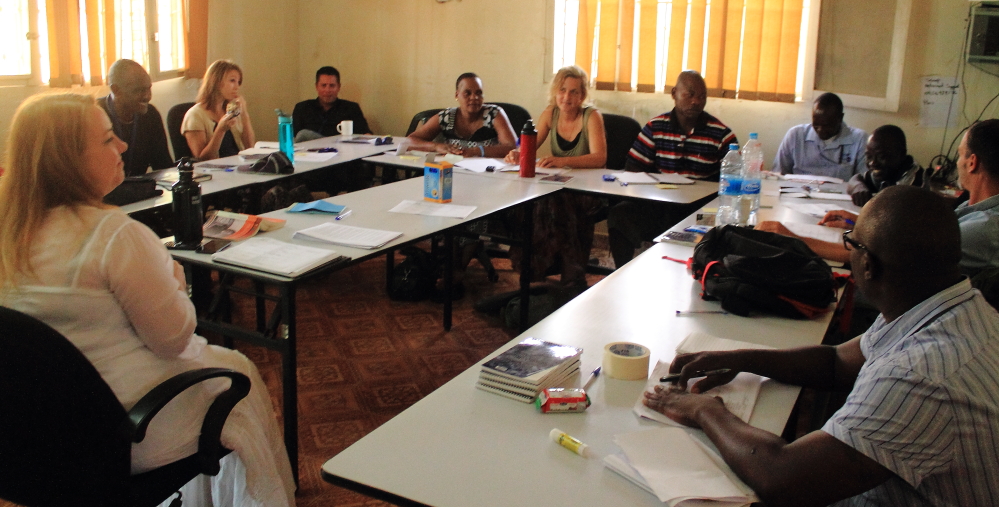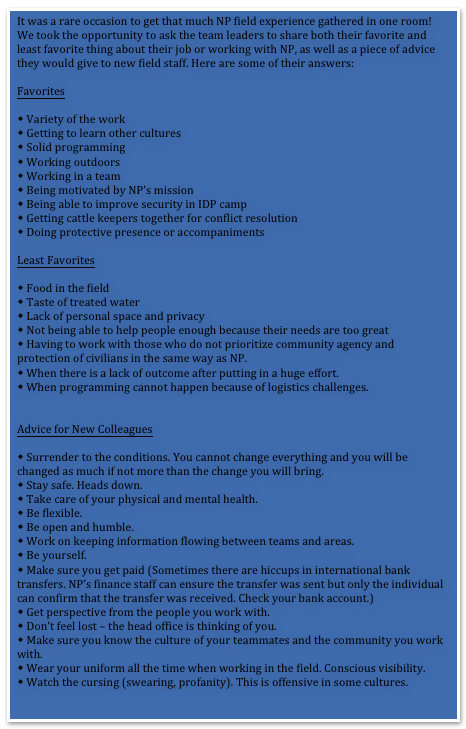Bringing the Team Leaders in from the Field

(Published Sept. 9, 2014)
This is why I was excited when I heard that Nonviolent Peaceforce in South Sudan was holding a team leaders meeting in Juba in July, and that I would get to participate. When it comes to achieving NP’s mission, team leaders just might be the most crucial component. Due to the civil war and its effects, it is more important than ever for us to succeed in our work and attain positive results. Investing in the team leaders is one of the best ways to ensure that we do so.
NP is growing and changing. Currently there are 10 field teams around the country and funding secured to start three more. There is a need to adapt programming in response to the current crisis, i.e., operating in UNMISS (United Nations Mission in the Republic of South Sudan) Protection of Civilian (POC) areas, the creation of a mobile response team and so forth. Team leader meetings like this one help ensure that all the field teams have the same vision for programming, and that they are able to share resources between isolated field sites. Recognizing the importance of this, the Nonviolent Peaceforce senior management team in South Sudan decided to make team leader meetings a quarterly activity.

I spent the first five months of 2014 working as one of these team leaders. It was the most challenging period of two difficult years spent in the field with NP. That time increased my respect and appreciation for the people who hold that position and do it well. Some of the team leaders at the meeting were brand new to NP or their position, while others brought years of experience from different NP country programs. They demonstrated the diversity that is one of NP’s strengths, coming from Australia, Brazil, Canada, Columbia, Ethiopia, Germany, Kenya, Mexico, USA, Zimbabwe, as well as South Sudan, Sri Lanka and the Philippines (three countries where NP has or used to have country programs). Everyone got to ask questions, discuss challenges, share experiences, and exchange advice. Both from their fellow team leaders and from the headquarters support and management staff who were also present at the meeting.
What I found most engaging in this meeting were the questions raised during our discussions about programming. How will we stay true to NP’s core principles, like being deeply immersed in communities and supporting the primacy of local actors, as we branch out into new modes of operations such as a mobile response team? What are the limits, if any, that we should put on our support of people with special needs or vulnerabilities in displacement sites - in order to prioritize our core unarmed civilian peacekeeping programming? Would we ever consider equipping our teams with bullet-proof vests and helmets, and if we did, how would that impact our security and our relationships with local communities? There are no easy answers to these questions, but they are important discussions to have as they shape how the team leaders think about important issues. In most cases, each team leader will end up making their own decisions pertaining to many questions that come up in the unique context of each field site, in consultation with their teams and Juba.
Tiffany ended the last session of the two-day meeting by giving her heartfelt thanks to the team leaders: “I have so much gratitude that you are implementing this programming. You are breaking new ground in unarmed civilian peacekeeping.” That night, most of the group went out for an NP “family dinner.” We enjoyed each other’s company and the relative luxury of Juba one last time before the team leaders dispersed across the country back to their field sites. Two days were not enough for all of the topics we had to cover, or all of the stories we had to share, but it was all the time we could spare; the team leaders are needed too much in the field. In Juba, we are all already looking forward to and planning for next quarter’s team leaders meeting. I hope the team leaders are, too.
By Calista Pearce.

